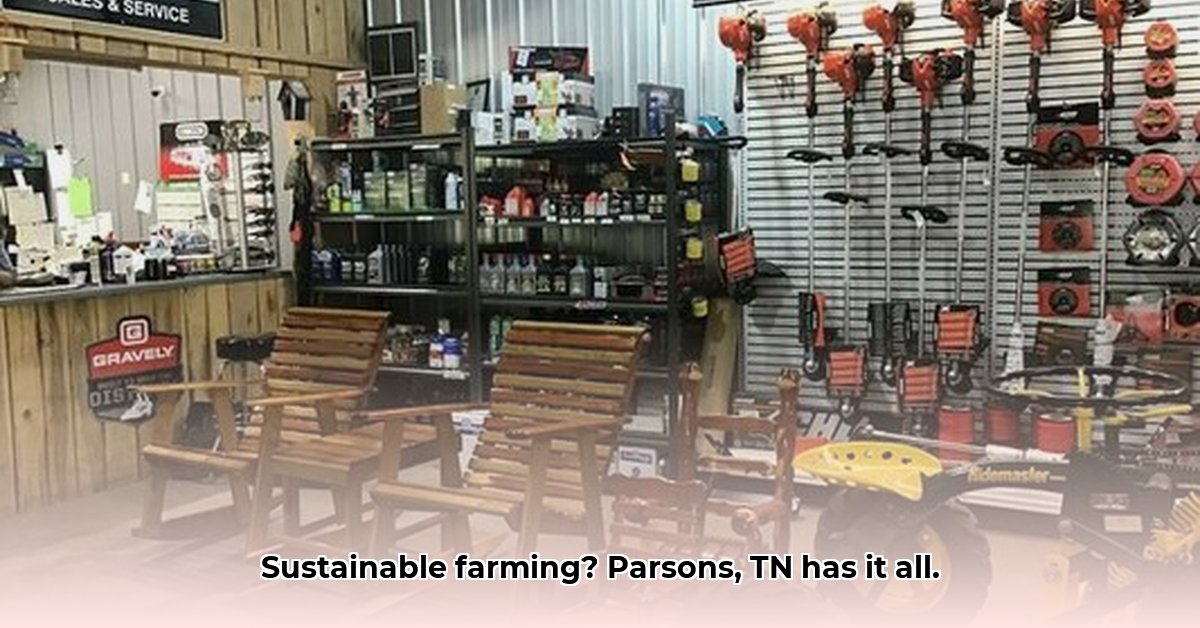
Harnessing Tractor Supply for Sustainable Agriculture in Parsons, Tennessee
Parsons, Tennessee, farmers and gardeners seeking sustainable practices often find themselves navigating a complex landscape of supply options. Tractor Supply (TSC), a familiar local presence, presents a unique opportunity – but requires a discerning approach. This article explores how to leverage TSC's vast inventory for sustainable farming, addresses its limitations, and proposes actionable steps for both consumers and the company itself. For similar stores in nearby areas, check out this example location.
Product Range & Potential for Sustainable Practices
TSC in Parsons offers a wide array of products, many of which can contribute to sustainable agriculture when carefully chosen. However, readily available sustainability certifications or detailed sourcing information are often lacking.
Livestock Supplies
TSC stocks feed, supplements, and other livestock essentials. While organic options might be limited, seeking out locally sourced feeds can minimize transportation emissions and support regional producers. Look for labels indicating reduced environmental impact or responsible sourcing practices, even if formal certifications aren't present. Remember to always question the origin and composition of your animal feed.
Gardening Products
The store’s gardening section includes seeds, fertilizers, and tools. Prioritizing organic or heirloom seeds directly supports biodiversity and often reduces the need for harmful synthetic chemicals. Selecting durable, long-lasting tools minimizes waste and reduces the environmental impact of frequent replacements. Consider the longevity and repairability of tools before purchase – a durable tool might cost more initially but it will save you money in the long run.
Fencing & Building Materials
TSC carries various fencing materials. Choosing durable, long-lasting options like pressure-treated lumber minimizes waste and reduces the environmental impact from frequent repairs or replacements. Considering the lifecycle and recyclability of materials is crucial; some materials have a significantly lower carbon footprint than others. What are the long-term implications of your choice?
Other Supplies
Beyond these core categories, TSC offers numerous other supplies. Look for products with minimal packaging, reusable components, or those made from recycled materials, consciously supporting environmentally responsible manufacturers. A small change in your purchasing habits can make a big difference.
Limitations and Areas for Improvement
A significant challenge lies in the lack of readily available information regarding the sustainability of TSC's product sourcing and supply chains. This lack of transparency hinders informed consumer choices. Detailed information on organic certifications, fair-trade practices, and environmentally friendly manufacturing processes is often absent. This information gap needs to be addressed.
Actionable Steps for Farmers & Gardeners
Despite the limitations, you can still significantly improve your sustainable agriculture practices at TSC.
Become a Label Detective: Carefully examine product labels for any details about origin and production methods. Even limited information can guide your choices.
Engage TSC Staff: Ask employees about sustainable options or local producers they work with. Their insights may reveal hidden sustainable choices.
Explore Alternatives When Necessary: If TSC lacks your desired sustainable option, research local farmers' markets, co-ops, or specialized online retailers. Supporting directly from the source is often more sustainable.
Prioritize Durability and Longevity: Invest in high-quality, long-lasting products to minimize future replacements and reduce waste. Consider the lifecycle cost of the item.
Reduce Packaging: Opt for products with minimal packaging whenever possible.
Recommendations for Tractor Supply
TSC can significantly enhance its contribution to sustainable agriculture by:
Conduct a comprehensive product audit: Identify and highlight sustainable options and areas for improvement in sourcing, manufacturing, and packaging.
Improve product labeling: Include clear labels for products meeting sustainability standards (organic, fair trade, etc.), detailing sourcing and production specifics.
Partner with local sustainable producers: Expand your sustainable goods selection by collaborating with local producers.
Publish a sustainability report: Enhance transparency with an annual report outlining your sustainability efforts, challenges, and future goals.
Train employees: Equip staff with the knowledge to assist customers making environmentally conscious choices.
Conclusion: A Collaborative Path to Sustainability
Building a sustainable agricultural future in Parsons requires a collaborative effort. Farmers, gardeners, and businesses like TSC all share the responsibility. By making informed choices, demanding transparency, and supporting sustainable practices, we can collectively work towards a more environmentally responsible future for our community.